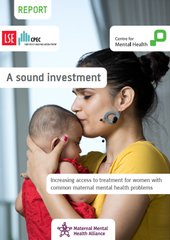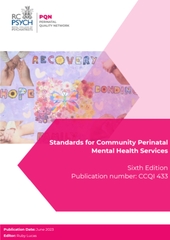Discover a wealth of resources designed to help you support women and families impacted by perinatal mental health problems. Whether you work in healthcare, local or national government we hope you find what you need.
We are in the process of updating the Hub, so if you have a resource to add or think something is missing, please email info@maternalmentalhealthalliance.org.

MMHA Pdf, 2.0mb
Published: February 2022
Commissioned by the MMHA, this policy briefing summarises the latest maternal mental health-related economic research from LSE and the case for action. It explores the current policy context for perinatal mental health care and how the case for investment can be implemented in practice.

MMHA Pdf, 2.9mb
Published: January 2023
This briefing contains key learning points that emerged from MMHA's domestic abuse and perinatal mental health roundtable in November 2022. Our aim is to take stock of what we know about the intersection of perinatal mental health and domestic abuse, including highlighting gaps in practice, policy and research.

Royal College of Psychiatrists Pdf, 516.0kb
Published: June 2023
These standards are designed to be applicable to community perinatal services and can be used by professionals to assess the quality of the team. The standards may also be of interest to commissioners, patients, carers, researchers and policy makers.

MMHA Pdf, 2.0mb
Published: April 2025
The Maternal Mental Health Alliance's eBulletin provides a regular update on the Everyone's Business campaign, which calls for all women throughout the UK with perinatal mental health conditions to receive the treatment they need, where and when they need it.

MMHA Pdf, 807.4kb
Published: May 2023
The MMHA has been mapping the provision of specialist perinatal mental health services across the UK since 2013. Using quality standards created by the Royal College of Psychiatrists’ Perinatal Quality Network to visualise levels of provision, these maps chart the postcode lottery women, babies, and families have faced in accessing essential, lifesaving care in their local area.

London School of Economics Pdf, 160.0kb
Published: May 2022
This supplement was developed in response to feedback we received from some members of our advisory group after publication of the report ‘The economic case for increasing access to treatment for women with common mental health problems during the perinatal period'.

MMHA Pdf, 1.1mb
Published: August 2024
This Listening Project was born out of a desire to listen to women who have experienced child removal due to drug and alcohol use, and learn about the impact this had on their mental health. We believe that listening to women’s experiences is the only way we’ll find out what’s not working, discover what will and take action in ways that address the root causes of injustice and exclusion.

MMHA Pdf, 316.6kb
Published: December 2023
Map produced by the Maternal Mental Health Alliance (MMHA) showing the locations of Mother and Baby Units (MBUs) across the UK, including contact details for each one. MBUs are specialist, in-patient units for women experiencing severe perinatal mental health problems where they can stay with their baby while they recieve care.

MMHA Pdf, 3.6mb
Published: May 2023
The Maternal Mental Health Alliance (MMHA) has been mapping levels of specialist PMH services across the UK since 2015. The last set of maps showing the state of the postcode lottery were released by the MMHA in early 2020, just at the start of the pandemic. Since then, clearly much has changed.